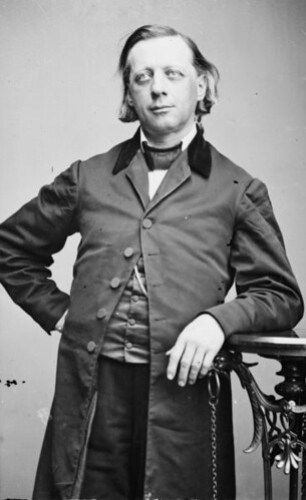Posts Tagged ‘adultery’
Tricks of (Historical) Perspective, Part 72…

These days, the name Henry Ward Beecher conjures, if at all, only in that it evokes his better-remembered sister, Harriet Beecher Stowe. But in his time Beecher (pictured above, in a Matthew Brady portrait) was a much more prominent presence.
The first pastor of the Plymouth Church in Brooklyn, New York, Beecher shared his sister’s commitment to social causes; in particular, to abolition. But at the same time he turned a gift for tempering self-improvement advice with dialect and humor into a fabulously-successful career on the lecture circuit. (Click here to read a wonderful example of Beecher’s helpful homilies, as reported in the Falkirk Herald in 1871.)
Such was Beecher’s standing that, the following year, when Beecher was outed (then subsequently tried) for adultery (with Theodore Tilton’s wife Elizabeth), it “drove Reconstruction off the front pages for two and a half years” and became “the most sensational ‘he said, she said’ in American history” (quoth Walter McDougall). Indeed, French author George Sand planned a novel about the affair, but died before it could be written.
In his time, Beecher was arguably The Most Famous Man in America.
###
As we look to our Ps and Qs, we might send a birthday verse to Henry Charles Bukowski; he was born on this date in 1920. The “laureate of American lowlife,” Bukowski discovered his muse as a young teen, when a friend introduced him to drinking (as recounted in Ham on Rye). “This [alcohol] is going to help me for a very long time”, he later wrote, describing the genesis of what was chronic alcoholism– or, as he saw it, the genesis of a method for making his way through life as a writer.
Van Gogh writing his brother for paints
Hemingway testing his shotgun
Celine going broke as a doctor of medicine
the impossibility of being human– “Beasts Bounding Through Time”
In the end, Bukowski wrote thousands of poems, hundreds of short stories, and six novels, eventually publishing over sixty books. As Adam Kirsch of The New Yorker observed, “the secret of Bukowski’s appeal. . . [is that] he combines the confessional poet’s promise of intimacy with the larger-than-life aplomb of a pulp-fiction hero.”
Thou shalt not…

Herman Cain's alleged extramarital affair with Ginger White lasted more than twice as long as Newt Gingrich's affair with Callista Bisek.
It’s possible that the trouble that led Herman Cain to “suspend” Herman Cain’s campaign for the Republican Presidential nomination is really just an elaborate conspiracy by a bipartisan coalition of five women who don’t even know each other to bring down his campaign. But in any case, in all of the discussion of the situation one question about Cain’s alleged conduct has been neglected: is it against the law?
As Tim Murphy writes in Mother Jones, in fact it is:
According to title 16, chapter 9, section 9 of the Georgia code of criminal conduct, “A married person commits the offense of adultery when he voluntarily has sexual intercourse with a person other than his spouse and, upon conviction thereof, shall be punished as for a misdemeanor.” At least Georgia adulterers are in good company; adultery is a criminal offense in 23 states, with punishments ranging from a $10 fine in Maryland to life imprisonment in Michigan (at least according to one judge). It’s also prohibited by the Uniform Code of Military Justice…
Lest one wonder about one’s own exposure, Murphy and his colleague Tasneem Raja provide a handy map:
 click here for larger interactive version
click here for larger interactive version
Murphy points out that (rogue Michigan judges notwithstanding) adultery laws are very rarely enforced. Still, they remain in the statute books of the states colored red (or should one say, “scarlet”?) thanks to the efforts of social-conservative activist groups and legislators, who’ve successfully resisted attempts to remove them… the same groups, of course, that were massed behind Cain, and now Gingrich.
Stranger than fiction, truth is…
Read the full story at “Map: Is Adultery Illegal?”
As we wonder if there’s a market in CDOs for the bonds of marriage, we might recall that it was on this date in 1936 that Edward VIII (Edward Albert Christian George Andrew Patrick David; later The Duke of Windsor) became the first English monarch voluntarily to abdicate his throne– a decision he made after the British government, public, and the Church of England condemned his decision to marry the American divorcée Wallis Warfield Simpson. In an address to the nation, Edward explained: “I have found it impossible to carry on the heavy burden of responsibility and to discharge the duties of king, as I would wish to do, without the help and support of the woman I love.” The following day, his younger brother, the duke of York, was proclaimed King George VI.
 The Duke and Duchess of Windsor (source)
The Duke and Duchess of Windsor (source)

You must be logged in to post a comment.